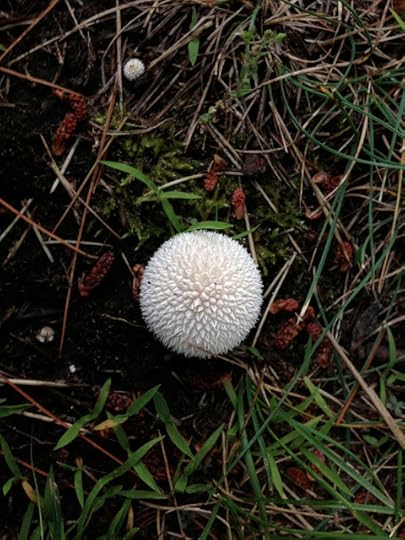The Point

The most basic of all symbols, of all marks of significance, of all visual directions to the interpreting mind is the period, the dot, the point, the full stop.
Anything less than the point is the blank space, a character as important as any other (and more important than most), but one that serves merely to subdivide visual sentences into words.
So nothingness is important, but the point is the beginning of something, of anything, the movement out of nothing and into thingness.
The least poem possible is not a one-word poem but a one-character poem, and the least of the latter is this poem of mine:
.
And the joy of ultraminimalism is finding the finest point, and the making of the poem out of the slightest object of written meaning.
Even suspended in the center of an imagined white square, the point is more than nothing, and it is many things all at one.
At first sight to our minds familiar with the obvious, the floating point is an ending. We realize and understand that, yet it floats, centered horizontally and centered vertically as well, so we wonder about its endingness.
It could, it seems, be the opposite of what it as first appears to be. The point could be a beginning, maybe a tiny opening, into a tunnel, into a burrow, into an enlarging darkness. It exists, after all, as the only black point on the white field of a bitonal world, so it would be right to be merely a representation of darkness, a point of foreboding.
But what if we see the point, instead, or simultaneously, as a decimal point, as a symbol reverse-decimating the value of any unseen numeral to the right of it, and as a symbol that leaves whole any numeral to its left? What is the meaning of a poem of unseen yet felt and intelligible mathematics? Is it merely a poem about itself? as the best poems seem to me to be.
Maybe our mind increases the complexity of the mathematical meaning of the point because we read it punningly, we read it as a representation of its name without the production of its name. Perhaps this floating point is the representation of the floating point and, thus, is more than a point. It is a system representing numbers that are changed by the floating of the point.
We can also perceive this simple point as a dot, as a period repurposed in a set of letters as if the letters in a word could be decimalized, as if each letter of a word is a code for a number and the numbers spell out the words for us, although none of them is visible.
Or the point is not a period, not a piece of punctuation at all, but the completion of a letter. Maybe the point is a tittle, the dot that tops only two of the letters of this plain and Latin alphabet. But the letter is itself hidden from us, invisible except for its top, the tittle, the natural stopping place when writing the letter.
And we have only two choices that this letter could be: an i or a j. And the j is only an extension of the i, an elongated version of the i, who am I, the person, the poet, the thinker of and on the poem, for every poem is about itself just as it is always about the poet because the poem is an expression out of the body.
So we now recognize our vantage point. We are looking down over the dot. The dot is falling away from us and down, hurtling down. It may be the full stop ending a sentence or the period inexplicably opening one. Or it is a decimal, a floater, a tittle (and, in threes, the ellipses, the dot, dot, dot of the unended, the upended sentence). And it is falling.
But the dot is not the poem. It is the herald of the poem. It is the cause, and the poem is the effect that we cannot yet see.
And when the dot hits the flat water, it makes a sudden funneled splash, and then out of it come wave after concentric wave of expanding circles, a series of circles that replicate the shape of the period and that extend only away from the point of impact, each circle diminishing in strength and visibility as it grows.
Until every circle grows out so far that it disappears, and each subsequent wave grows out, each less so than the last, until each wave flattens into nothing, and the face of the water stills . . .
and we look at nothing but the blank white page we once imagined a period upon.
ecr. l'inf.
Published on July 24, 2013 20:56
No comments have been added yet.



